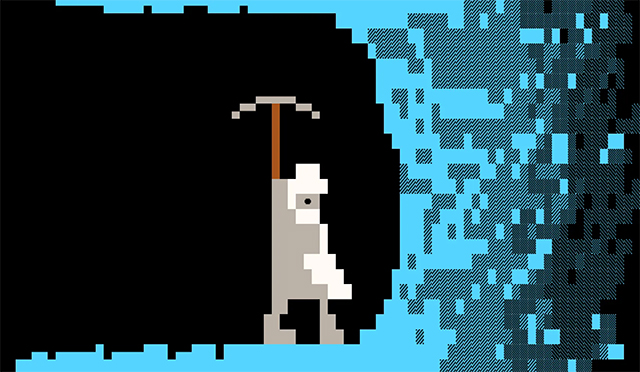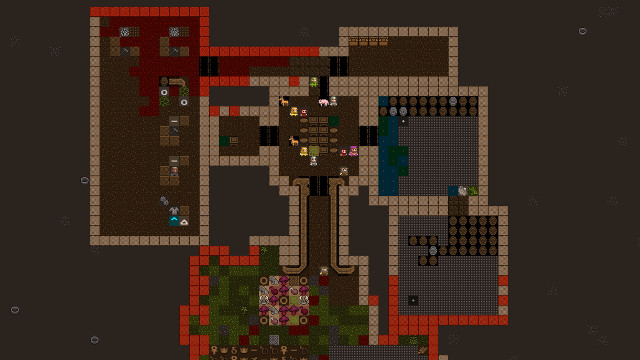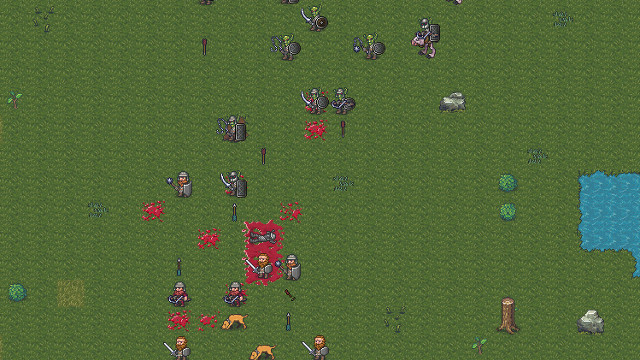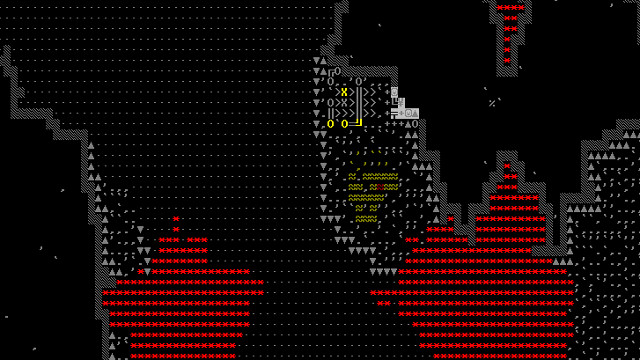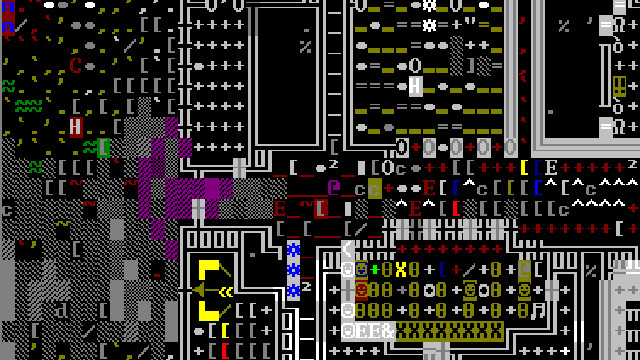Why do people like Dwarf Fortress? To an outsider, this seems like an extraordinarily difficult game to understand with blocky, primitive graphics. And sure, those can be entirely valid criticisms. But those who brush off this game for its difficulty are missing out on one of the most rewarding experiences that exist in video games today.
Why do people like Dwarf Fortress? | Complexity facilitates depth
Dwarf Fortress is a simulation game where you build a fortress and try to keep your dwarves alive. It seems like a simple premise that’s easily explained in the title, but couldn’t be further from the truth as those sim elements run absurdly deep and require an art style that simple.
I’ll admit with no reservations that Dwarf Fortress is a terribly complex game. I had to read for hours just to figure out what I was doing and had no desire to play it without some kind of graphical texture pack. Once I got into it, however, I was hooked.
ALSO: Games Like Dwarf Fortress | The best construction and management games in 2019
If you’re wondering why people like Dwarf Fortress, this level of depth is one of the strongest reasons. I can build whatever I like (and however I like) within the confines of the world and the game’s very extensive ruleset.
Here’s an example: my go-to defense for a fort requires that it be somewhat near a river on the surface. I dig a trench up to the entrance of my fort and set up a series of floodgates. When enemy invaders try to come through my front door, I lock things up, flood the channel, and loot the dead. I didn’t read a guide about this. This isn’t explained in a tutorial. I just saw one of my dwarves drown once and thought that I could weaponize that very system against my enemy.
Why do people like Dwarf Fortress? | Losing is fun!
The unofficial motto of Dwarf Fortress is, “Losing is fun!” Some players will sometimes spell it “xx!!FUN!!xx”, designating an item that is falling apart (the Xs) and on fire (the exclamation points). It is undeniably a chaotic game where anything and everything can go wrong and that nearly infinite challenge is one of the answers to the question presented herein.
Dwarf Fortress isn’t really a game that you can “win” as you can only fend off defeat for as long as possible. Inevitably, some small thing will slip by and cause the complete collapse of your Dwarven society more often than not. When things do fall apart, that’s when you dust yourself off and try again.
It’s a special sort of trap. You’ll think that you have a handle on things, only for some small error or an unexpected event to cause the situation to rapidly spiral out of control. My dismay at losing inevitably lasts no more than a day before the gears start turning. What if I did X or Y instead? What if those variables will make me my fortress last longer? What if these changes make my base into the ultimate, impenetrable fortress? To date, I have yet to find any game as challenging and, consequently, as compelling.
Why do people like Dwarf Fortress? | Dark practicality
Without avail, one of the things that will come up when discussing Dwarf Fortress is the notion that players are a wee bit sociopathic. The world of Dwarf Fortress is a cruel place, and part of that cruelty is often inflicted by the player to their denizens.
One of the lighter examples is “cave adaptation.” Dwarves are quite happy to stay underground all day, but they probably should make occasional trips to the surface. If they don’t, they’ll get something called cave adaptation. This affliction essentially makes them violently vomit when they’re exposed to the sunlight on the surface.
At best, it’s a minor inconvenience. At worst, about half of your axedwarves will be hurling their lunch instead of furious axe blows, greatly reducing their combat effectiveness. The solution is to place important facilities like dining halls and training areas above ground, which is a nice thing to figure out.
Things can (and do) get a bit darker from there. On the same subject of soldiers, Dwarf Fortress also accounts for psychological damage in a fashion. A soldier who has seen too many horrors will get shell-shocked, acquiring the “doesn’t care about anything anymore” status. While most people would be saddened or horrified to learn about such trauma, a true Dwarf Fortress player will not only embrace it — they’ll industrialize it and weaponize it.
How is this “problem” solved? Animals, goblins, or really anything living and vaguely sapient are captured, penned up at a great height, and dropped to the death in a high-traffic area. This steady flow of falling bodies makes a mess and it also exposes anyone who passes through to terrible trauma, making them deeply troubled dwarves — but also highly-effective warriors who show no fear in battle. This is all horrifying, but it showcases Dwarf Fortress‘ impeccable depth and variability.
Why do people like Dwarf Fortress? | Mastering it is highly rewarding
Many players out there are unconcerned with difficulty. I myself often prefer to play on medium or slightly-above medium difficulty on most games. I want a challenge, but I don’t want another job.
Mastering Dwarf Fortress is not akin to “another job.” Dwarf Fortress is 12 years in university and a lifetime of 70-hour workweeks. It takes a serious amount of study, careful thought, innovation, and practical experience to truly be able to call yourself a master of the game.
When you genuinely understand the game and can execute that understanding, you’ll be able to do what other players can only dream of. Many fear digging into Hell, lest they unleash a never-ending wave of nigh unkillable demons that even an experienced army will have a tough time fighting. Others look at this as just another challenge, much like the one legendary player who not only survived this onslaught but colonized Hell itself.
This is just one of the many tales that have done the rounds over the years. The player who colonized Hell. The player who pumped lava to the sky and created the Dwarven equivalent of an orbital death ray. The player who slew a bronze colossus by throwing a bunny rabbit at its head really hard. These men were recorded in the annals of Dwarf Fortress legend, not as the madmen they probably are but as people to look up to for doing the impossible. They put in the time and were rewarded for it.
Why do people like Dwarf Fortress? | The memes
Lastly but far from least, the memes and culture surrounding Dwarf Fortress are well-appreciated, both by the actual players of the game and the people who only have a passing familiarity. There are many points in the history of Dwarf Fortress that attained legendary status both within the community and without. Elephants, carp, and a variety of other seemingly innocuous animals were, at one time, lethal enemies far beyond what a player would expect to see from such a creature. Innovative players managed to industrialize mermaid genocide, an act that developer Tarn Adams found so horrifying that he consequently nerfed the value of the mermaid bones that were being sold to passing traders. Elves were annoying as ever and relentlessly mocked as tree-hugging hippies at every turn. Nobles are eternally useless and often meet with “tragic accidents”.
While these are all notable points in the history of the game, they do little to bring it to a new audience. That is where the classic Let’s Play community of the SomethingAwful forums came in, highlighting a number of “succession” games where a list of players each took a turn playing it for one in-game year. While there are many fine examples in the Let’s Play archives, the standout example is undeniably Boatmurdered.
Boatmurdered was a Let’s Play that perfectly encapsulated everything that was appealing about the game. The Fortress of Boatmurdered at first seemed like an ideal site to set up a base, but the players quickly realized that the roaming bands of Elephants were a deadly threat. Dwarf, man, and dog alike all fell to these great beasts — never mind the countless other dangers like the rushing river rapids, goblin invasions, or — Armok forbid — a lack of alcohol.
Ultimately, Boatmurdered culminated in one of the players creating something called “Project F*ck The World,” a system that pumped lava outside of the mountain. This quite literal scorched-earth policy went from the equivalent of a doomsday weapon to a tool that was used with frightening regularity, and it continued to be used right up until the fortress inevitably collapsed to an internal disaster. It did, however, come close to destruction once when a butterfly jammed the front door open, and yes, you did indeed read that sentence correctly.
An innocent expedition in search of a new home led the dwarves to a land filled with murderous elephants, ultimately culiminating in a doomsday weapon and a death spiral of increasingly-ridiculous scenarios that left only two survivors in a fortress once occupied by over a hundred souls. It’s a bizarre, true story that displays that sheer ludicrous amount of player storytelling possible in the game. And yes, that also means those stories can become memes.
So, why do people like Dwarf Fortress? It challenges you. It beats you into a fine paste — and then you learn to industrialize paste production, refine it, sell it, and turn it into a superweapon. It drives me mad, and I love every rewarding minute of it.
